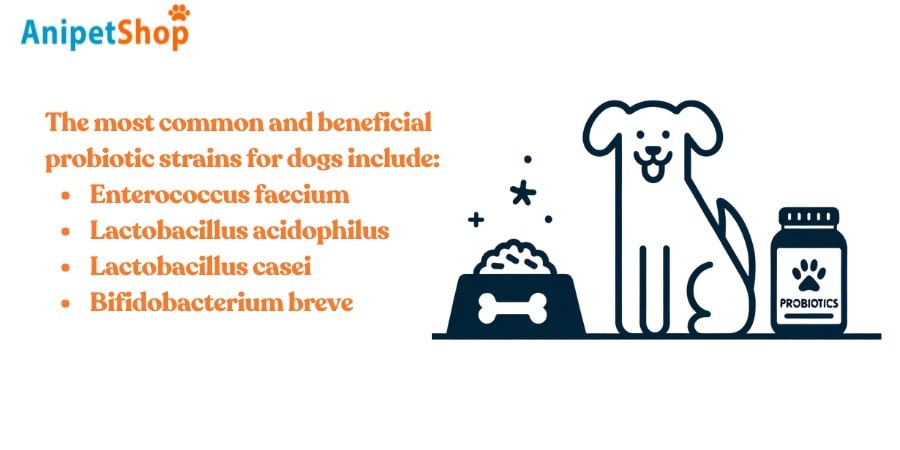What are Probiotics for Dogs and How They Work?
Probiotics have gained significant attention in the world of pet care, as more pet owners seek natural solutions to support their dogs’ overall well-being. If you’re wondering about the probiotics for dogs, this article delves into the world of probiotics for canines, exploring the different types, their benefits, potential side effects, and whether they are suitable for puppies.

What are Probiotics for Dogs and How They Work?
Probiotics for dogs are live microorganisms, including bacteria and yeasts, that are beneficial for maintaining a healthy digestive system. These beneficial microbes play essential roles such as breaking down food, producing vital nutrients and vitamins, combating harmful bacteria, and bolstering the immune system. There is also evidence suggesting they can influence mood through the “gut-brain axis”
When a dog’s gut microbiome becomes imbalanced due to stress, illness, or poor nutrition, probiotics can help restore this balance. They work by replenishing the population of good bacteria in the digestive tract, supporting overall gastrointestinal health and function. Probiotics have been shown to prevent and alleviate issues like diarrhea, constipation, inflammation, and certain behavioral problems related to gut-brain axis imbalances.
Studies highlight the specific benefits of certain probiotic strains for dogs. For example, Lactobacillus and Bifidobacterium species are commonly included in supplements to support intestinal health and immune function. These strains can help restore the intestinal microbiome after imbalances, improve appetite, and reduce symptoms like diarrhea (PetMD). Additionally, probiotic supplementation has been associated with improved gut barrier function and modulation of the immune system (Vetstreet).
Types of Probiotics for Dogs
The most common and beneficial probiotic strains for dogs include:
- Enterococcus faecium: This strain is effective at restoring intestinal balance and inhibiting the growth of harmful bacteria. It is often included in probiotic supplements for dogs to help maintain a healthy gut microbiome.
- Lactobacillus acidophilus: Known for its role in breaking down lactose, this lactic acid bacteria also fights harmful pathogens and supports immune function. It is commonly used to improve digestive health and prevent gastrointestinal issues.
- Lactobacillus casei: This strain is notable for its ability to survive stomach acid, promoting digestive and gut health. It helps in maintaining a balanced gut flora, which is crucial for overall digestive wellness.
- Bifidobacterium breve: This probiotic species helps metabolize carbohydrates and produce key nutrients necessary for the body. It supports gut health by producing short-chain fatty acids that nourish the gut lining (Today’s Veterinary Practice).
- Bifidobacterium lactis: This strain produces short-chain fatty acids that are essential for nourishing the gut lining and supporting overall digestive function. It is beneficial in maintaining a healthy and balanced intestinal environment (Today’s Veterinary Practice).

While human probiotics are generally considered safe for dogs, it’s not recommended to give them your human probiotic supplements. While generally safe, the bacterial strains in them aren’t tailored for canine digestion and might disrupt their gut balance. These supplements might even contain ingredients harmful to dogs. Talk to your vet about dog-specific probiotics to ensure the right strains and dosage for your furry friend’s optimal gut health.
Benefits of Probiotics for Dogs
Probiotics can provide a range of benefits for dogs by promoting a healthy balance of gut microbiota. The available evidence suggests they can be helpful in managing several common health issues.
- Diarrhea: Probiotics help restore the proper balance of good and bad bacteria in the digestive tract, which can alleviate diarrhea by inhibiting the growth of harmful pathogens.
- Gas: Certain probiotic strains, like Lactobacillus and Bifidobacterium, can improve the digestion of fiber and complex carbohydrates, reducing gas production.
- Obesity: Probiotics may aid in weight management by influencing factors like appetite, energy metabolism, and the composition of the gut microbiome.
- Bad Breath: Probiotic supplements can help reduce the population of bacteria that produce volatile sulfur compounds, a common cause of canine halitosis.
- Allergies: Probiotics have been shown to modulate the immune system and reduce inflammatory responses, which can lessen the severity of dog allergies.
While the research on probiotics for dogs is still limited compared to human studies, the available evidence indicates they can be a useful tool for supporting digestive health, immune function, and overall well being in canine companions. As with any supplement, it’s important to consult with a veterinarian to determine the appropriate probiotic strains and dosage for your dog’s specific needs.

Do Probiotics Have Side Effects for Dogs?
While probiotics are generally safe and well-tolerated by dogs, it is possible for some canines to experience mild side effects, particularly when first starting a probiotic supplement or at high dosages.
Some of the potential side effects of probiotics in dogs include:
- Digestive Discomfort: Dogs may experience temporary abdominal pain, bloating, or discomfort as their gut microbiome adjusts to the new influx of beneficial bacteria.
- Diarrhea: In some cases, probiotics can initially cause loose stools or diarrhea as the digestive system works to process the new microorganisms.
- Constipation: Conversely, probiotics may lead to temporary constipation in certain dogs as the gut flora shifts.
- Gas: An increase in gas production is a common side effect as the probiotics ferment fiber and carbohydrates.
- Changes in Appetite: Adjusting to a probiotic supplement may cause some dogs to exhibit decreased or increased appetite in the short term.
These side effects are usually mild and tend to subside within the first week or two as the dog’s body adapts to the probiotic. However, if the digestive symptoms persist or worsen, it’s important to consult a veterinarian. They can help determine if the probiotic is the right fit or if an alternative supplement or dosage may be needed.
The Pros and Cons of Probiotics for Dogs?
Probiotics can be a valuable tool for supporting your dog’s gut health, especially during times of stress or digestive issues. The pros of probiotics include:
- Improved Digestive Health: Probiotics can help regulate a dog’s digestive system, alleviating issues like constipation, diarrhea, gas, and bloating.
- Healthier Skin and Coat: Probiotics can promote a shinier, healthier coat and help manage certain skin conditions and rashes.
- Boosted Energy Levels: Probiotics may help increase a dog’s energy and vitality by supporting overall health.
- Yeast Infection Management: Probiotics can help control yeast overgrowth, which can cause various infections.
However, there are some cons of probiotics that you need to concern:
- Adjustment Period: A dog’s symptoms may temporarily worsen before improving as their body adjusts to the probiotic supplement.
- Potential Side Effects: Dogs may experience mild digestive discomforts like diarrhea, constipation, bloating, or gas when first starting probiotics.
- Difficulty Administering: Some dogs may resist taking probiotic supplements, especially if they are in tablet form.
- Trial and Error: Pet owners may need to experiment with different probiotic strains or dosages to find the right fit for their dog.
- Underlying Conditions: Probiotics may not address serious underlying health issues, so veterinary consultation is recommended before use.

Can Puppies Take Probiotics?
Yes, vets can sometimes recommend specially-designed dog probiotics for puppies. These can be a lifesaver for young pups whose developing bodies face changes like new diets and potential anxiety, leading to digestive issues.
While gradual dietary changes are ideal, sometimes even the best efforts can result in tummy troubles. Probiotics can be a great solution here, but always consult your vet first. Remember, various factors can cause puppy upset stomachs, and ruling out serious issues is crucial.
FAQs
How long should a dog be on probiotics?
For healthy dogs, probiotics can be included in the diet intermittently, such as for one week every month. For dogs with digestive or other conditions that may benefit from probiotics, they should be given daily for at least 8 weeks to evaluate their effectiveness.
Is it okay to give dogs probiotics every day?
Yes, dogs can be given probiotics daily as part of their long-term health care. Providing probiotics proactively before stressful events can also be beneficial.
When should you give your dog probiotics?
The best time to give dogs probiotics is first thing in the morning, as there is less stomach acid at that time, allowing the probiotics to work more effectively. However, the ideal timing may vary depending on the specific probiotic supplement, so it’s best to follow the manufacturer’s recommendations.
Can dogs take human probiotics?
No, dogs should not take human probiotic supplements. Dogs have a different digestive system and gut microbiome compared to humans, so human probiotics may not be effective or could even cause adverse effects in dogs. It’s important to use probiotic products that are specifically formulated for canine health.
Do probiotics cause weight gain in dogs?
There is a study found that the probiotic strains tested were effective in reducing body fat and weight in dogs, even on a high-fat diet. The probiotics activated energy metabolism and shifted the body towards fat consumption rather than accumulation. This helped alleviate obesity and related issues like inflammation, rather than causing weight gain.
Conclusion
Incorporating probiotics into your dog’s routine can be a valuable addition to their health regimen. By understanding the different types of probiotics, their benefits, and potential side effects, you can make an informed decision on whether probiotics are the right choice for your canine companion. Whether you have a puppy or an adult dog, it’s essential to consult with your veterinarian to ensure the safe and effective use of probiotics for your furry friend.
Lily Watson is an author specializing in veterinary care in Australia. With a profound passion for animal welfare and a solid foundation in veterinary science, Lily has dedicated herself to disseminating valuable knowledge and information for both pet owners and professionals in this field.

